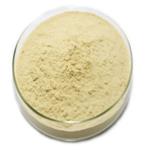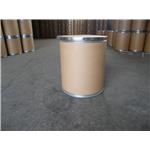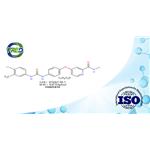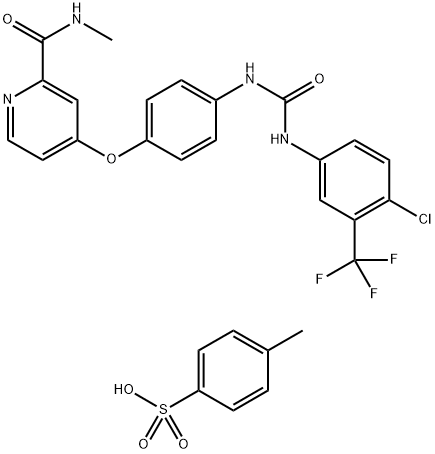Sorafenib tosylate: mechanism of action, clinical applications and safety
Oct 9,2023
General Description
Sorafenib tosylate is a medication that inhibits tumor angiogenesis by targeting cell proliferation and angiogenesis pathways. It targets serine-threonine kinase Raf and several tyrosine kinases involved in tumor growth. Its efficacy and safety have been demonstrated in renal cell carcinoma, including nonclear-cell histology and brain metastases. Common adverse events include diarrhea, hand-foot skin reactions, anorexia, and weight loss. Discontinuation of treatment and dose interruptions occur in a percentage of patients. Overall, sorafenib tosylate is generally well-tolerated and shows promise as a targeted therapy for advanced cancers.

Figure 1. Tablets of sorafenib tosylate
Mechanism of action
Sorafenib tosylate is a medication that inhibits the serine-threonine kinase Raf and several tyrosine kinases involved in tumor angiogenesis. It exerts its antitumor activity by targeting both cell proliferation and angiogenesis. Sorafenib inhibits Raf kinase, which is a key regulator of cell proliferation and survival. Additionally, it inhibits tyrosine kinases such as VEGFR-2, VEGFR-3, PDGFR-β, c-KIT, Flt-3, FGFR1, and RET, which are involved in tumor angiogenesis. By targeting these pathways, sorafenib acts on both tumor cells and endothelial cells/pericytes, effectively inhibiting their growth and survival. The antiangiogenic properties of sorafenib have been demonstrated in various tumor models. However, the importance of its inhibitory activity on the MAPK pathway varies depending on the type of tumor. For example, it plays a crucial role in hepatocellular carcinoma (HCC) but its relevance in kidney cancer is still being defined. Overall, sorafenib tosylate shows promise as a targeted therapy for inhibiting tumor growth and angiogenesis. 1
Clinical applications
The results of the two global expanded access programs (EAPs) for sorafenib tosylate in advanced renal cell carcinoma (RCC) have confirmed its antitumor activity and safety. Patients treated within these programs are representative of a broader range of RCC patients in the community than those enrolled in the TARGET study. The response rates and toxicities observed in the EAPs were similar to those reported in the phase III TARGET study, demonstrating the consistency of the drug's efficacy and tolerability. Sorafenib tosylate also proved to be active and tolerable in previously untested patient populations, including those with nonclear-cell histology, brain metastases, and previous treatment with other antiangiogenic agents. Additionally, it has shown effectiveness in elderly patients (>65 years of age). These findings broaden the clinical applications of sorafenib tosylate beyond clear-cell RCC and expand its potential use in clinical practice. The drug's ability to be safely managed in patients with brain metastases is especially noteworthy, as this was an early concern. Overall, the results of these EAPs reinforce the potential of sorafenib tosylate as a targeted therapy for advanced RCC and other cancers. 2
Safety
Sorafenib tosylate is generally well-tolerated in patients with advanced hepatocellular carcinoma, with a manageable adverse event profile. The most common sorafenib-related adverse events of any grade included diarrhea, hand-foot skin reactions, anorexia, alopecia, weight loss, dry skin, abdominal pain, and voice changes. Grade 3 AEs reported in significantly more sorafenib recipients than placebo recipients included diarrhea, hand-foot skin reactions, and weight loss. The only reported Grade 4 AE was fatigue. Discontinuation of sorafenib due to treatment-emergent AEs occurred in 38% of patients, with GI AEs, fatigue, and liver dysfunction as the most common reasons for discontinuation. Sorafenib-related AEs leading to permanent discontinuation occurred in 11% of patients. Dose interruption due to AEs occurred in 44% of sorafenib recipients, with dose reductions occurring in 26%. Results from clinical trials and real-world studies indicate that sorafenib has a similar tolerability profile in CP class A and B patients. In general, the tolerability profile of sorafenib in real-world settings appeared consistent with that seen in the pivotal phase 3 trials, regardless of ethnicity. However, the incidence of hand-foot skin reactions appeared numerically higher in Japanese patients, and the rate of sorafenib discontinuation due to AEs appeared numerically higher in Japanese patients than in other populations. In summary, sorafenib tosylate is generally safe and well-tolerated in patients with advanced HCC. 3
Reference
1. Porta C, Paglino C, Imarisio I, Ferraris E. Sorafenib tosylate in advanced kidney cancer: past, present and future. Anticancer Drugs. 2009 Jul;20(6):409-415.
2. Thompson Coon J, Hoyle M, Green C, Liu Z, Welch K, Moxham T, Stein K. Bevacizumab, sorafenib tosylate, sunitinib and temsirolimus for renal cell carcinoma: a systematic review and economic evaluation. Health Technol Assess. 2010 Jan;14(2):1-184.
3. Keating GM. Sorafenib: A Review in Hepatocellular Carcinoma. Target Oncol. 2017 Apr;12(2):243-253.
- Related articles
- Related Qustion
- Sorafenib Tosylate: Biological Activities and Future Developments Mar 19, 2024
Sorafenib tosylate, effective in hepatocellular carcinoma and renal cell carcinom, aims for enhanced efficacy through combinations with other agents, despite challenges in managing adverse events.
- About Sorafenib tosylate Aug 14, 2019
Sorafenib is used to treat kidney, liver, and thyroid cancer. It is a chemotherapy drug that works by slowing or stopping the growth of cancer cells.
Mertansine, a maytansine derivative, is always used to prepare antibody-drug conjugates.....
Oct 9,2023APICJC-1295, a synthetic GHRH, has four amino acid substitutions which improve protease resistance.....
Oct 9,2023Biochemical EngineeringSorafenib tosylate
475207-59-1You may like
Sorafenib tosylate manufacturers
- Sorafenib tosylate
-

- $100.00 / 1kg
- 2024-05-24
- CAS:475207-59-1
- Min. Order: 1kg
- Purity: 99.99%
- Supply Ability: 100Tons
- Sorafenib tosylate
-

- $100.00 / 1kg
- 2024-05-24
- CAS:475207-59-1
- Min. Order: 1kg
- Purity: 99%
- Supply Ability: 1t
- Sorafenib Tosylate
-

- $0.00 / 1kg
- 2024-05-09
- CAS:475207-59-1
- Min. Order: 1kg
- Purity: 99%,single impurity<0.1
- Supply Ability: 1 ton





